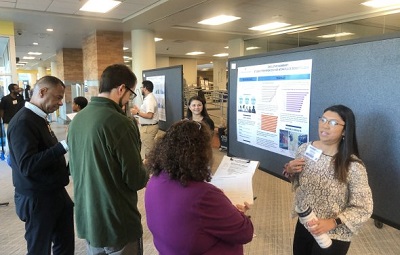Optimizing In-Vitro Transcription of a Coxsackievirus RNA Replication Element
Description/Abstract/Artist Statement
Picornaviruses are small RNA viruses responsible for illnesses such as hand-foot-mouth disease, poliomyelitis, and the common cold. With limited treatment for the picornaviruses, a detailed understanding of the structure is important to finding potential therapeutic targets. Two complimentary replication platforms, the cloverleaf of either the viral genome (5’CL) or the template strand (3’CL), could prove to be ideal targets. Previous work has shown distinct structural features of the 5’CL, but little is known about the 3’CL structure. We aim to determine the structure of the two stemloops (SLB and SLD) and the full 3’CL for Coxsackievirus B3 using Nuclear Magnetic Resonance (NMR) and Small-Angle X-Ray Scattering (SAXS). However, prior to analysis the samples must first be produced via T7 in-vitro transcription. This process, and its optimization, will be explored in this presentation.
Faculty Advisor/Mentor
Steven Pascal
Faculty Advisor/Mentor Department
Chemistry and Biochemistry
College Affiliation
College of Sciences
Presentation Type
Poster
Disciplines
Biochemistry
Session Title
Poster Session
Location
Learning Commons Lobby @ Perry Library
Start Date
3-30-2024 8:30 AM
End Date
3-30-2024 10:00 AM
Optimizing In-Vitro Transcription of a Coxsackievirus RNA Replication Element
Learning Commons Lobby @ Perry Library
Picornaviruses are small RNA viruses responsible for illnesses such as hand-foot-mouth disease, poliomyelitis, and the common cold. With limited treatment for the picornaviruses, a detailed understanding of the structure is important to finding potential therapeutic targets. Two complimentary replication platforms, the cloverleaf of either the viral genome (5’CL) or the template strand (3’CL), could prove to be ideal targets. Previous work has shown distinct structural features of the 5’CL, but little is known about the 3’CL structure. We aim to determine the structure of the two stemloops (SLB and SLD) and the full 3’CL for Coxsackievirus B3 using Nuclear Magnetic Resonance (NMR) and Small-Angle X-Ray Scattering (SAXS). However, prior to analysis the samples must first be produced via T7 in-vitro transcription. This process, and its optimization, will be explored in this presentation.


